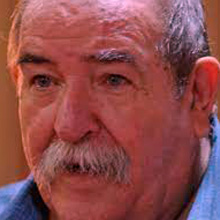De Matanzas, Cuba, como yo. Humorista gráfico y audiovisual de calidad internacional. Un fuera de serie. Es decir, fue ilustrador, caricaturista, historietistas, guionista, realizador de dibujos animados y director de cine cubano Me refiero a Juan Manuel Padrón Blanco, más conocido como Juan Padrón y “Padroncito”, para su amigos.
Es un honor tenerlo en este vis a vis conmigo para Humor Sapiens.
Por si hay algún lector que no lo conoce, aquí van algunos datos que recopilé:
Comenzó su carrera en 1963, trabajando como dibujante de historietas de humor en la revista Mella y en El Sable.
Su personaje más famoso fue Elpidio Valdés que apareció por primera vez en la revista Pionero en 1970. Cuatro años más tarde Juan Padrón se inició como director de dibujos animados en el Instituto Cubano del Arte e Industria Cinematográfica (ICAIC).
Realizó su primer largometraje en 1979. Se trató del filme Elpidio Valdés. Un año más tarde inició su serie Filminuto (1980), otro de los proyectos que le hizo ganar fama y respeto en el universo de la animación dentro de Cuba y en el mundo. El Filminuto 1 es considerado la primera obra maestra del dibujo animado cubano.
Realizó su su tercer largometraje, Vampiros en La Habana, de gran éxito internacional. En 1985 Juan Padrón en colaboración con el humorista argentino Quino (Joaquín Lavado) da vida a los Quinoscopios, incluido entre los clásicos del cine de animación contemporáneo en Latinoamérica.
Padrón fue miembro de la Unión de Escritores y Artistas de Cuba (UNEAC). En su vida recibió múltiples premios y condecoraciones. Entre ellos se destacan la medalla Alejo Carpentier (1988), el Premio de periodismo Juan Gualberto Gómez (1989), el Premio Nacional de Humorismo de Cuba (2004), el Premio Nacional de Cine de Cuba (2008), el premio El Diablo Cojuelo y ocho Premios Coral del Festival Internacional del Nuevo Cine Latinoamericano, entre otros.
Espero que haya quedado bien presentado.
Y con toda la admiración del mundo, comenzamos este vis a vis...
PP: Padrón, ¿Te gusta que te hagan entrevistas?
PADRÓN: Si son con chispa, sí. Muchas veces me piden contestar planteamientos de alto vuelo intelectual, o boberías como eso de preguntarle a un visitante qué le parece Cuba.
PP: Maestro, ¿piensas que tu quehacer creativo se astringe a los cánones de un carácter acriollado o algo más ecuménico?... ¡No! Disculpa, esa no era la pregunta, ja, ja.. La primera pregunta es, ¿cómo ves el estado actual del humor en Cuba, en televisión, radio, teatro, literatura y gráfica?
PADRÓN: En realidad no sigo el humor que se hace ahora, porque muy pocas veces me hace gracia. Antes, seguía a los maestros como Marcos Behemaras, Núñez Rodríguez, y Héctor Zumbado. No se han vuelto a dar gente como ellos, de nivel internacional, sobre todo como Zumbado. Eran muy criollos pero se notaba que su cultura era muy fuerte, y se reflejaba en sus trabajos.
PP: Sí, para mí, Zumbado es un ídolo. Tú sabes que en varios países de América Latina se dice: "Mi país es un pueblo de humoristas", "en mi país, tú mueves una piedra y sale un humorista”, etc. ¿En Cuba se dice lo mismo?
PADRÓN: En muchos países latinoamericanos hay buen humor, producen piezas muy ocurrentes y de gran calidad. Coincido con Virulo en la teoría de que en Cuba hay un sentido del humor generalizado, pero de puro y duro choteo cubano. Mira publicaciones de humor, programas de televisión, radio, lo que quieras, y verás que si no eres cubano, o no comprendes el código del cubaneo, no entenderás ni papa, nananina. Quino me comentaba que era raro que hubiera tanto buen dibujante aquí, y sin embargo casi ninguno hacía humor para un público internacional. También muchos humoristas parecen no distinguir cuando hacen cosas de mal gusto y cuando no.
PP: Según mi modesta y molesta opinión, en Cuba, como en casi todos los países latinoamericanos (no digo todos porque no me gusta el absolutismo), es la burla, más que el buen humor lo que impera. Ya sabemos lo que decía Jorge Mañach sobre el choteo cubano, y también hay que tener en cuenta la teoría de Miguel de Marcos, de que los cubanos no somos alegres, sino lo contrario, somos tristes y esa supuesta alegría que nos caracteriza es un disfraz. No sé, pero sí estoy seguro que buenos humoristas ha dado Cuba, pero son puntos navegando en un río de cerveza, como dice un amigo mío. Y sobre lo de que los humoristas no distinguen cuando hacen humor de mal gusto y cuando no, creo que es lo que le sucede a todo el mundo. Como decía mi padre “los hediondos no se huelen”. Muchos creen que porque hacen reír a unos cuantas personas de tan mal gusto como ellos, ya hacen buen humor. En fin, que creerse y decir que uno es humorista no te hace humorista. Y a propósito de triste o alegre, para ti, ¿es verdad la acuñada frase: "Es más fácil hacer llorar que hacer reír”?
PADRÓN: Creo que sí. El humor es cosa seria y se necesita, aparte de una fuerte dramaturgia, un sentido del timing, y un toque especial, como en el chiste de los presos con los chistes numerados.
PP: Ya es un clásico ese chiste. Pues sí, estoy de acuerdo. Las desgracias abundan más en la vida que los cómico momentos. Quizás por eso cueste más crear humor. ¿Cuándo decidiste hacerte humorista?
PADRÓN: De niño dibujaba historietas, pero como no se me daba bien la figura humana, me pasé a las caricaturas. Leía muchas revistas de humor. Según mi familia, era un bofe, siempre haciendo chistes pesados, tratando de mostrar qué era simpático. Repetía dicharachos. Mi abuelo Horacio me dijo: “Oye, la primera vez es chiste, la segunda, no”. Eso lo vine a entender muchos años después.
PP: Ojalá yo hubiera tenido el don de dibujar, porque me leía y coleccionaba “muñequitos”, como los del Pájaro Loco, Las dos urracas, etc., (solo historietas cómicas me gustaban). Bueno, no le saqué provecho como tú desarrollando el dibujo, pero es un hecho que desarrollan el sentido del humor. Y como ti, al ir creciendo me fui volviendo más “payaso”, “centro de mesa”, “pujón”. ¿Será un proceso obligado en los futuros humoristas? ¿O solo les pasa a los matanceros? Ja, ja? Bueno, te pregunto entonces, ¿para ti el humorista nace o se hace?
PADRÓN: Creo que nace. Cuando juegas de niño, y te pones a inclinar los carritos de juguete para que patinen de lado en las curvas, o los pones más lentos al saltar por los aires, o haces tus efectos de sonido, es que te fijas en esas cosas de las películas o los animados, las quieres imitar. Los niños que serán contables o burócratas, no mueven con onda los carritos, les da igual. No se ponen para eso. Lo mismo pasa con los humoristas, empiezan a imitar a otros humoristas, le van tomando el pulso a la cosa. Pero naces para eso, seguro.
PP: Me gustó esa imagen de diferenciar cómo juegan con los autos de juguete los profesionales futuros. Yo también creo que nacen. Pero también pienso que se pueden hacer con esfuerzo, consciencia, ganas de superación y estudio. Pero concentrémonos mejor en ti. Por ejemplo, ¿cuál ha sido el mejor y el peor momento de su carrera hasta el día de hoy?
PADRÓN: Muchos momentos, porque hay mucho iluminado que quiere censurar el humor. Debe ser porque no lo tienen. Y buenos con el público.
Un momento malo: cuando me dijeron que Vampiros en La Habana estaba fustete, que no era lo que esperaban de mí, que no tendría conferencia de prensa ni estreno.
Uno bueno: cuando la misma película rompió record de taquilla en el primer mes de exhibición y se vendió en todo el mundo.
PP: Ahora que tengo la oportunidad, te confieso que Vampiros en La Habana no solo creo que es la mejor película de dibujos animados que se ha hecho en Cuba, porque eso lo saben todos. También creo que es la mejor película cubana de todos los tiempos. Y para no ser polémico, la dejo en la que más me ha gustado a mí. La he visto como 4 veces y siempre me río como un bobo. Hay que ser un cavernícola con un CI de 0,02 para decir que estaba mala y censurarla. Pero bueno, ya sabemos… Ahora dime, como profesional del humor, ¿te ríes fácil? ¿Con qué tipo de chistes?
PADRÓN: Creo que me río bastante…. Sí, me ha gustado mucho Cuba.
PP: No seas así. No te hice una pregunta como las que no te gustan, esta pregunta la hago siempre a mis humoristas entrevistados para comparar sus respuestas y hacer una reflexión. Fíjate que dije “como profesional”, era para saber qué tipo de humor te gusta más. Te diré que hay colegas que me confiesan que no se ríen nunca. Y otros que solo se ríen de tal cosa o de tal otra y esos datos me interesan para “locuras teóricas”. Pero seguimos… ¿nos puedes contar alguna anécdota relacionada con esta profesión?
PADRÓN: Una madrugada, en “La Pelota”, esperando la confronta, se me apareció un flaco muy flaco, patilludo, con gorra, y me dijo: Rey del Mundo, regálame un ssigarrito ahí, Rey del Mundo.
Años después, lo dibujé en Vampiros en La Habana.
PP: ¡Tremendo personaje! Oye, ¿con cuáles colegas te identificas?
PADRÓN: Me gustan los chistes de Manuel y Ares.
PP: Dos grandes. Tengo la suerte de que son amigos míos. Y para cerrar: ¿qué me aconseja a mí como humorista?
PADRÓN: A mí me vino bien leer a Ramón Mesa, Miguel de Marcos, estudiar las revistas Karikatos, The New Yorker, Zig-Zag, El Pitirre… ir atrás, y ver qué hacían otros humoristas cubanos, cuando uno era todavía una ñinguita en el hiberespacio, o cuando empezaba a garabatear. Coincido con Zumbado en que hay que estudiar la historia de tu oficio. Meter rigor, esto se cosa seria, tú.
PP: De manual esos consejos. En mi caso sigo también a Zumbado. Esto que estoy haciendo contigo es parte del trabajo que hago para estudiar esa historia. Usted ya es un clásico del humor cubano que respeto mucho.
Gracias por tu tiempo y atención. Te deseo lo mejor del mundo y que sigan los éxitos.
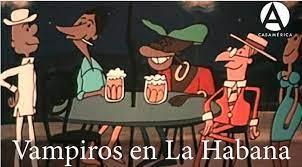
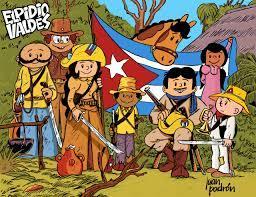
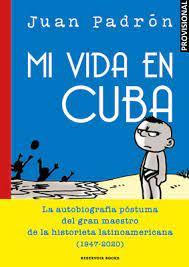
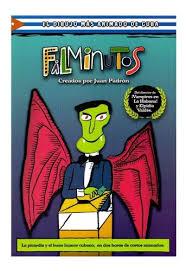
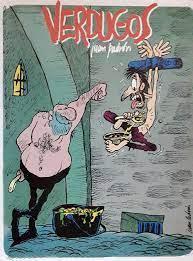
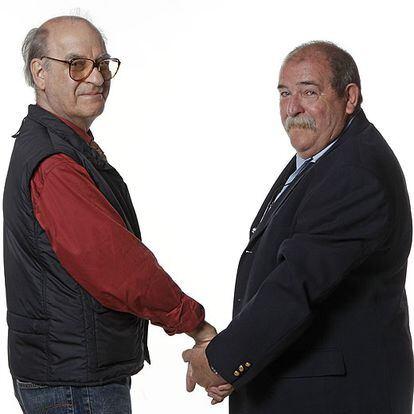
Quino y Padrón
By Pepe Pelayo
Humor is serious
From Matanzas, Cuba, like me. Graphic and audiovisual comedian of international quality. An out of series. That is, he was an illustrator, caricaturist, cartoonist, screenwriter, cartoonist and Cuban film director. I am referring to Juan Manuel Padrón Blanco, better known as Juan Padrón and “Padroncito”, to his friends.
It is an honor to have you in this section “dialocating” with me for Humor Sapiens.
In case there are any readers who don't know it, here are some data I collected:
He began his career in 1963, working as a humor comics artist for Mella magazine and El Sable.
His most famous character was Elpidio Valdés, who appeared for the first time in Pionero magazine in 1970. Four years later Juan Padrón began as a cartoon director at the Cuban Institute of Cinematographic Art and Industry (ICAIC).
He made his first feature film in 1979. It was the film Elpidio Valdés. A year later he began his Filminuto series (1980), another of the projects that earned him fame and respect in the universe of animation within Cuba and in the world. Filminuto 1 is considered the first masterpiece of Cuban cartoons.
He made his third feature film, Vampiros en La Habana, which was a great international success. In 1985, Juan Padrón, in collaboration with the Argentine comedian Quino (Joaquín Lavado), gave life to Quinoscopios, included among the classics of contemporary animated cinema in Latin America.
Padrón was a member of the Union of Writers and Artists of Cuba (UNEAC). In his life he received multiple awards and decorations. Among them, the Alejo Carpentier medal (1988), the Juan Gualberto Gómez Journalism Award (1989), the National Humor Award of Cuba (2004), the National Film Award of Cuba (2008), the El Diablo Cojuelo award stand out. and eight Coral Awards from the International Festival of New Latin American Cinema, among others.
I hope it has been well presented.
And with all the admiration in the world, we begin this dialogue.
PP: Padrón, do you like being interviewed?
PADRON: If they are with spark, yes. Many times I am asked to answer highly intellectual questions, or stupid things like asking a visitor what they think of Cuba.
PP: Master, do you think that your creative work is restricted to the canons of a Creole character or something more ecumenical?... No! Sorry, that wasn't the question, ha ha... The first question is, how do you see the current state of humor in Cuba, on television, radio, theater, literature and graphics?
PADRON: I don't really follow the humor that is done now, because it very rarely makes me laugh. Before, he followed teachers like Marcos Behemaras, Núñez Rodríguez, and Héctor Zumbado. There have not been people like them again, at an international level, especially like Zumbado. They were very Creole but you could tell that their culture was very strong, and it was reflected in their work.
PP: Yes, for me, Zumbado is an idol. Do you know that in several Latin American countries it is said: "My country is a town of comedians", "in my country, you move a stone and a comedian comes out", etc. Is the same thing said in Cuba?
PADRON: In many Latin American countries there is good humor, they produce very witty and high-quality pieces. I agree with Virulo in the theory that in Cuba there is a generalized sense of humor, but of pure and simple Cuban jokes. Look at humorous publications, television programs, radio, whatever you want, and you will see that if you are not Cuban, or you do not understand the code of Cubano, you will not understand anything, nananina. Quino told me that it was strange that there were so many good cartoonists here, and yet almost none of them made humor for an international audience. Also many comedians seem not to distinguish when they do things in bad taste and when they don't.
PP: According to my modest and annoying opinion, in Cuba, as in almost all Latin American countries (I don't say all because I don't like absolutism), it is mockery, more than good humor, that prevails. We already know what Jorge Mañach said about Cuban choteo, and we must also take into account Miguel de Marcos's theory, that Cubans are not happy, but on the contrary, we are sad and that supposed joy that characterizes us is a disguise . I don't know, but I am sure that Cuba has produced good comedians, but they are points sailing in a river of beer, as a friend of mine says. And about how comedians don't distinguish when they make bad humor and when they don't, I think that's what happens to everyone. As my father said “you can't smell stinkers”. Many believe that because they make a few people laugh with such bad taste as they do, they already create good humor. In short, believing and saying that you are a comedian does not make you a comedian. And regarding sad or happy, for you, is the coined phrase true "It's easier to make people cry than to make them laugh"?
PADRON: I think so. Humor is a serious thing and it requires, apart from strong dramaturgy, a sense of timing, and a special touch, as in the prisoners' joke with the numbered jokes.
PP: That joke is already a classic. Well yes, I agree. Misfortunes abound more in life than comical moments. Maybe that's why it's harder to create humor. When did you decide to become a comedian?
PADRON: As a child I drew comics, but since I wasn't good at the human figure, I switched to cartoons. I read a lot of humor magazines. According to my family, he was a fool, always making bad jokes, trying to show that he was nice. He repeated sayings. My grandfather Horacio told me: “Hey, the first time it's a joke, the second time it's not.” I came to understand that many years later.
PP: I wish I had had the gift of drawing, because I read and collected “little dolls”, like those of Woody Woodpecker, The Two Magpies, etc., (I only liked comic strips). Well, I didn't take advantage of it like you did by developing drawing, but it is a fact that they develop a sense of humor. And like you, as I grew older I became more of a “Clown,” “centerpiece,” “push.” Will it be a mandatory process for future comedians? Or does it only happen to people from Matanzas? Ha ha? Well, I ask you then, for you, a comedian is born or made?
PADRON: I think it is born. When you play as a child, and you start to tilt the toy cars so that they skid sideways on curves, or you slow them down when jumping through the air, or you make your sound effects, it's because you notice those things in the movies or animated ones, you want to imitate them. The children who will be accountants or bureaucrats, do not move the carts with wave, they do not care. They don't set themselves up for that. The same thing happens with comedians, they begin to imitate other comedians, they get their pulse on things. But you're born for it, for sure.
PP: I liked that image of differentiating how future professionals play with toy cars. I also believe that they are born. But I also think that they can be done with effort, awareness, desire to improve and study. But let's focus better on you. For example, what has been the best and worst moment of your career to date?
PADRON: Many moments, because there are many enlightened people who want to censor humor. It must be because they don't have it. And good with the public.
A bad moment: when they told me that Vampiros in Havana was bad, that it was not what they expected of me, that I would not have a press conference or premiere.
A good one: when the same film broke the box office record in the first month of release and sold all over the world.
PP: Now that I have the opportunity, I confess that Vampiros in Havana not only do I think it is the best animated film that has been made in Cuba, because everyone knows that. I also think it is the best Cuban film of all time. And so as not to be controversial, I'll leave it to the one I liked the most. I've seen it like 4 times and I always laugh like a fool. You have to be a caveman with an IQ of 0.02 to say that it was bad and censure it. But hey, we already know... Now tell me, as a humor professional, do you laugh easily? With what kind of jokes?
PADRON: I think it is born. When you play as a child, and you start to tilt the toy cars so that they skid sideways on curves, or you slow them down when jumping through the air, or you make your sound effects, it's because you notice those things in the movies or animated ones, you want to imitate them. The children who will be accountants or bureaucrats, do not move the carts with wave, they do not care. They don't set themselves up for that. The same thing happens with comedians, they begin to imitate other comedians, they get their pulse on things. But you're born for it, for sure.
PP: I liked that image of differentiating how future professionals play with toy cars. I also believe that they are born. But I also think that they can be done with effort, awareness, desire to improve and study. But let's focus better on you. For example, what has been the best and worst moment of your career to date?
PADRON: Many moments, because there are many enlightened people who want to censor humor. It must be because they don't have it. And good with the public.
A bad moment: when they told me that Vampiros in Havana was bad, that it was not what they expected of me, that I would not have a press conference or premiere.
A good one: when the same film broke the box office record in the first month of release and sold all over the world.
PP: Now that I have the opportunity, I confess that Vampiros in Havana not only do I think it is the best animated film that has been made in Cuba, because everyone knows that. I also think it is the best Cuban film of all time. And so as not to be controversial, I'll leave it to the one I liked the most. I've seen it like 4 times and I always laugh like a fool. You have to be a caveman with an IQ of 0.02 to say that it was bad and censure it. But hey, we already know... Now tell me, as a humor professional, do you laugh easily? With what kind of jokes?
PADRON: I think I laugh a lot…. Yes, I really liked Cuba.
PP: Don't be ironic. I didn't ask you a question like the ones you don't like, I always ask that question to my interviewed comedians to compare their answers and reflect. I will tell you that there are colleagues who confess to me that they never laugh. And others who only laugh at one thing or another and those data interest me for “theoretical madness.” But we continue... can you tell us any anecdotes related to this profession?
PADRÓN: One early morning, in “La Pelota”, waiting for the confrontation, a very skinny, whiskered man with a cap appeared to me and said: King of the World, give me a ssigarrito there, King of the World.
Years later, I drew him in Vampiros en La Habana.
PP: Tremendous character! Hey, which colleagues do you identify with?
PADRÓN: I like Manuel and Ares' jokes.
PP: Two big ones. I'm lucky that they are friends of mine. And to close: what advice do you have for me as a comedian?
PADRÓN: It was good for me to read Ramón Mesa, Miguel de Marcos, study the magazines Karikatos, The New Yorker, Zig-Zag, El Pitirre... go back, and see what other Cuban comedians did, when one was still a little bit in hiberspace, or when I started to doodle. I agree with Zumbado that you have to study the history of your profession. Put rigor in, this is serious, you.
PP: Those tips are manual. In my case I also follow Zumbado. What I am doing with you is part of the work I do to study that history. You are already a classic of Cuban humor that I respect a lot.
Thanks for your time and attention. I wish you the best in the world and continued success.
(This text has been translated into English by Google Translate)

